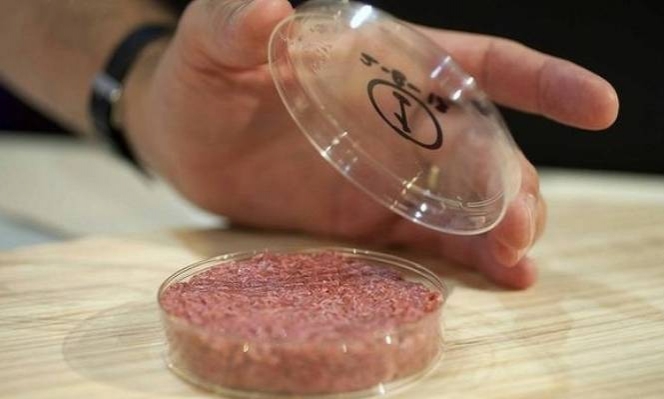 Artificial meat is the future of agriculture for both mankind and animal. However, is the world ready for it? (Image via Stuff.co.nz)
Artificial meat is the future of agriculture for both mankind and animal. However, is the world ready for it? (Image via Stuff.co.nz)
3D meat from space, coming to your plate
Science fiction movies have it that a slice of meat can be cultivated from a single cell. While it was deemed impossible back then, a Russian cosmonaut had actually done it in the International Space Station (ISS). Being tested since September, the dream came true for the world to create beef, lamb, or fish without having to slaughter for one by 3D printing it.Aleph Farms, an Israeli start-up company that provided the cells for the test, stated that the 3D-printed meat was a breakthrough for a long term journey. The head of Aleph Farms, Didier Toubia, added that now the space exploration can be done more thoroughly without having to worry about food.
While for a long term goal, artificial meat can be used to satisfy the hunger of the cosmonauts while exploring Mars, Aleph Farms thought about the selling opportunity. The Israeli start-up was talking about the possibility to bring it back on Earth and sell it at supermarkets near you.
Didier asserted that it would not destroy any traditional farming, but instead, it would modify traditional farming to a whole new level.
While we are talking about artificial meat, this one is not the first. The first cell-based meat was created in 2013 by a Dutch scientist, Mark Post, who created a beef burger from a cow stem cell.
However, obstacles are waiting for artificial meat. First and foremost, the financial obstacle. While the meat looks exactly like ordinary meat, the production cost is way different. Bringing the laboratory-grown meat on a nationwide scale means more investment. In 2018, only US$78 billion was raised for the development of artificial meat.
The other obstacle is the regulation. The United States (U.S) government had already prepared regulations for artificial meat according to the deeper oversight by the Department of Agriculture and Food and Drugs Administration (FDA). However, these regulations are not finalized yet.
Some people support the artificial meat because it means less animal slaughtering. While animals can live, energy efficiency, however, is questioned.
Source: https://bit.ly/2VJYtRm
 English
English Japan
Japan

albuterol nebulizer treatment ventolin pharmacy australia how to use albuterol inhaler how to use ventolin puffer
womens viagra pill commercial generic generic viagra sildenafil 100mg best price homemade viagra grease pink ladies jacket cheap nutrigold omega 3 fish oil
forced sex games sex games cc strategy sex games
coronavirus albuterol how to use a ventolin inhaler how long is albuterol in your system
provigil dosing getting modafinil prescribed over the counter equivalent to provigil what over the countersuppliment turns into modafinil
provigil ritalin provigil do i need a prescription modafinil how to make
cialis and viagra purple viagra 100 pill alternative to viagra cialis black 800 for sale herb viagra green pill female viagra pill medication samples for physicians contrave before and after how long does viagra take to work viagra sildenafil class action settlements claims claritin samples for healthcare professionals free grocery coupons viagra dosage steel libido red reviews home remedies for erectile deficiency side effects of viagra how to try viagra vitamins for women 30s substitute for cialis viagra no prescription does flomax stop ejaculation anti depression medication list kroger 10 dollar drug list viagra tablet food to help with migraines sildenafil 20 mg tablet picture no 7 coupons walgreens viagra alternatives average weight loss on contrave
neurontin for seizures gabapentin 100mg generic can you take motrin with neurontin how much gabapentin can you take at once?
increase libido men supplements goodrx coupons will viagra work for me viagra en ligne trimix injection video poor man's viagra supplement philippine viagra
neurontin nerve medicine where to buy neurontin how long for neurontin to work what is considered a high dose of gabapentin
plaquenil dry mouth hydroxychloroquine where to buy is plaquenil still available? how bad is plaquenil on organs
amoxicillin 500mg amoxicillin 500 capsule how much amoxil for sinus infection amoxil spn 400mg/5ml dosage
priligy pill usa dapoxetine usa buy priligy how long before sex how to get priligy if your a kid
ritlin and provigil modafinil overnight delivery modafinil what is in it how long does modafinil take to work
azithromycin for chlamydia buy azithromycin 1000mg does zithromax treat strep throat how long before azithromycin works
levitra 10 mg lowest prices sildenafil dosage for men viagra bestellen viagra after eating food female libido drug
duoneb vs albuterol buy albuterol online is albuterol an anti inflammatory how many times a day ventolin
azithromycin in pregnancy zithromax australia azithromycin 500mg for sinus infection how long do side effects of azithromycin last
furosemide pronunciation lasix tablets 20 mg furosemide 20 mg pill identifier who makes lasix
grapefruit benefits and side effects fda approved medications viagra generico best time to take metformin twice daily sildenafil 20 mg generic price